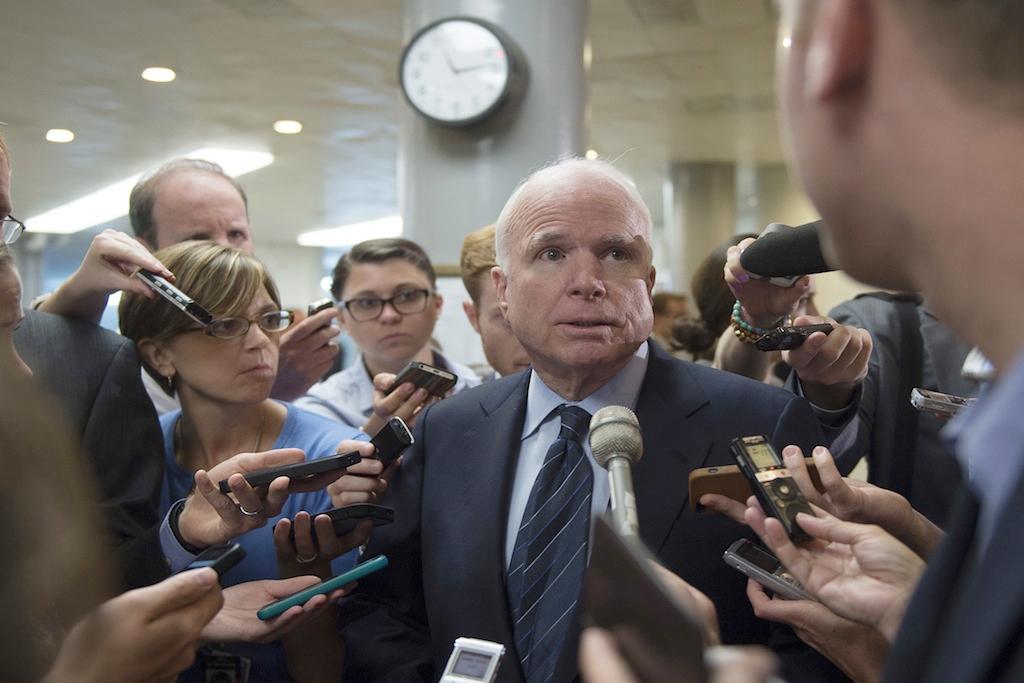Few common interests undermine thoughts of US-Iran cooperation in Iraq
US Senators John McCain (C), R-AZ, talks to reporters after a closed meeting on Iraq and Afghanistan on Capitol Hill in Washington, DC, July 8, 2014.
DENVER —The blitzkrieg-like advance of the Islamic State of Iraq and al Sham in Iraq and its successive victories in that country’s Anbar, Ninewah, Diyala and Salah al Din provinces have provoked fanciful speculation of cooperation between the US and Iran to stem the extremists’ advance.
One major problem undercuts such talk. While the US and other western and Arab countries may share with Iran a common enemy in ISIS, we share no common interests.
The US and its allies seek a rejuvenation of Iraq’s flagging democracy and a restoration of balance and inclusiveness in its government; the goal is to usher in reduced violence, less corruption and greater stability.
Sunnis, Kurds and other ethnic and religious minorities must be included in the country’s governing structures and their rights must be protected.
Whatever one’s views of the American invasion of Iraq, these are goals the US eventually sought and arguably was on the way toward achieving in various measure by the time of its withdrawal at the end of 2011. The US and its allies in the West and the Middle East continue to pursue those goals, without American boots on the ground.
Iran, too, seeks to stanch the Sunni extremist rise in Iraq. ISIS and other al Qaida-like fanatics hold beliefs wholly inimical to Shi’a, which dominate Iran and comprise the majority of Muslims in Iraq. In many extremist quarters, Shi’a Muslims are seen as apostates and more despised than either Jews or Christians.
But while Iraqi stability may be desirable, infinitely more important to Iran is that Iraq be governed by Iraqi Shi’a allied to Tehran and only nominally democratic. Such a government in Baghdad would provide a pro-Iranian Shi’a buffer to the Sunni-majority Arab world as well as a vital link in the Iranian chain of influence extending from Tehran through Syria to its client, Hezbollah, in Lebanon.
Even while the US, the other permanent members of the UN Security Council and Germany negotiate with Iran to curb its nuclear weapons program, Tehran continues to support terrorist groups and militia throughout the region, and threatens Arab states and Israel.
Many instances of terrorism and criminal behavior by Iran and Hezbollah should be weighed in any consideration of cooperation with Iran.
Throughout the US’s eight-year occupation of Iraq, Iran armed and provided critical advice and intelligence to Iraqi Shi’a militias fighting coalition and Iraqi forces. It helped recruit Iraqi Shi’as and supplied deadly armor-piercing rockets responsible for the deaths of numerous American troops.
Iran has provided an estimated $1 billion dollars in weapons, assistance, and military and intelligence advisers to maintain Syrian dictator Bashar al Assad in power; Hezbollah has supplied hundreds, perhaps even thousands, of fighters to Assad’s army.
The 1983-1984 bombing of the US Embassy and Marine barracks in Beirut, which killed 17 Americans and 244 US Marines, was the work of Hezbollah and its Iranian backers.
Hezbollah also was responsible for the 1985 hijacking of a TWA flight from Athens that led to the execution-style murder of a US Navy diver, Robert Stethem, and for the 1985 kidnapping, torture and murder of the CIA station chief, William Buckley.
Hezbollah, with Iranian backing, has carried out repeated attacks against individual Israelis, Israeli embassies and other Jews in Thailand, Bulgaria, Cyprus and Argentina.
In 2011, Iran attempted to assassinate Saudi Arabia’s ambassador to Washington.
Iran continues to provide safe haven to terrorists, including those wanted for the 1996 bombing of Khobar Towers in Saudi Arabia that killed 19 US airmen.
Iranian agents aggressively sought to “buy” candidates in the Iraqi parliamentary elections in 2010, according to candidates with whom I spoke.
These examples barely scratch the surface of criminal Iranian and Hezbollah activity since the 1979 Islamic revolution in Iran.
Lacking a genuine democracy itself, Iran is ill suited for serious support of democracy in Iraq. Even now, Iran is reviewing possible Iraqi Shi’a candidates whom it might accept to replace the flagging premiership of Nouri al Maliki. These are hardly the actions of a government interested in shoring up democracy in Baghdad.
In fact, while Iran might like to see Iraq remain intact, it would likely accept partitioning the country among Sunnis, Shi’a and Kurds along sectarian lines. This possible outcome would also be acceptable to Tehran as long as Baghdad and southern Iraq remained securely in Shi’a hands.
Iran’s Supreme Leader Ayatollah Ali Khamenei is not willing to allow his country’s interests in Iraq be undermined and is prepared to dispatch Iran’s crack Iranian Revolutionary Guard Corps and Al Quds Force to Iraq.
Tehran’s policies, especially its support for terrorism and its repressive internal policies, make it inconceivable the US and Iran have grounds for cooperation in Iraq, or anywhere else.
Gary Grappo is a retired senior Foreign Service officer from the State Department. He has served in the Middle East, including as US ambassador to the Sultanate of Oman, Head of Mission of the Jerusalem-based Office of the Quartet Representative, and Minister Counselor for Political Affairs at the US Embassy in Baghdad.
We want to hear your feedback so we can keep improving our website, theworld.org. Please fill out this quick survey and let us know your thoughts (your answers will be anonymous). Thanks for your time!
